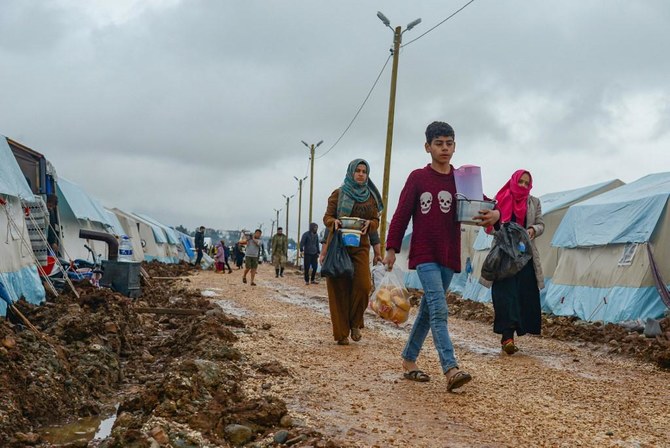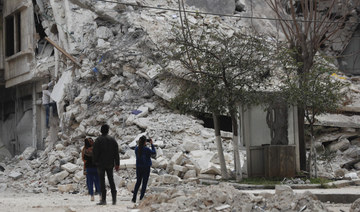BRUSSELS: The European Union and international donors on Monday pledged seven billion euros ($7.5 billion) to help Turkiye and Syria in the aftermath of the earthquake that devastated parts of the neighboring countries last month.
Ursula von der Leyen, the president of the EU’s executive arm, said 3.3 billion euros ($3.5 billion) of the total amount will be raised by the 27-nation bloc.
The magnitude 7.8 earthquake on Feb. 6 killed more than 52,000 people — the vast majority in Turkiye. Nearly 300,000 buildings in Turkiye either collapsed or were severely damaged, according to the country’s president.
“We have shown to the people in Turkiye and Syria that we are supporting those in need,” Von der Leyen said, adding that the global pledge included 1.1 billion euros from the EU’s executive arm, and 500 millions from the European Investment Bank, backed by the EU budget.
Turkish President Recep Tayyip Erdogan addressed the conference via videolink and described some of the reconstruction challenges, including deadly floods that hit parts of the earthquake zone last week.
“Some of the aftershocks have been going on for a while and they are of equal magnitude to a separate earthquake,” he said. “We have been fighting against the flood disasters and challenging weather conditions.”
Erdogan said some 298,000 buildings across 11 provinces affected by the earthquake were destroyed or left unfit for use.
“No single country can fight against such a disaster, regardless of its level of economic development,” he said, putting the cost of reconstruction at $104 billion. “Your contributions made at this conference will contribute to the healing of wounds and wipe clean the traces of this disaster.”
The conference hosted by the European Commission and Sweden — which holds the rotating presidency of the EU — was attended by NGOs, G-20 countries and UN members as well as international financial institutions.
Survivors of the earthquake in rebel-held northwest Syria have received very little assistance because of deep divisions exacerbated by the country’s 12-year war. The EU said 15.3 million Syrians of a population of 21.3 million already required humanitarian assistance before the earthquake struck.
The bloc has been providing humanitarian aid to Syria since 2011 and wants to step it up. But it does not intend to help with reconstruction in the war-torn country, with EU sanctions against the Syrian regime of President Bashar Assad in place due to its continued crackdown against civilians.
Von der Leyen said the Commission pledged an additional 108 million euros ($115.8 million) in humanitarian aid for Syria on Monday.
“All together we managed to raise with our partners 950 million euros ($1 billion) for the people in Syria,” she said. “This is just the first step.”
The International Rescue Committee, an aid group responding to humanitarian crises, had urged donors to ensure that the UN’s appeal for Turkiye and Syria — calling for $1 billion and $397 million respectively — is fully funded.
“The people affected by this devastating earthquake are relying on donors meeting in Brussels to step up this week,” said Tanya Evans, the IRC’s Country Director in Syria. “They need to ensure that funding is available for life-saving items including food, shelter, warm clothes and clean water, as well as support to the already weak health care system including the provision of medicines and medical equipment. If they fail to do so, the most vulnerable will pay the price,” she added.


Donors pledge $7.5 billion for Turkiye, Syria after quake
Short Url
https://arab.news/zzn59
Donors pledge $7.5 billion for Turkiye, Syria after quake

- Nearly 300,000 buildings in Turkiye either collapsed or were severely damaged, according to Erdogan
- “We have shown to the people in Turkiye and Syria that we are supporting those in need,” Von der Leyen said
UN says Israel’s West Bank plans would accelerate ‘dispossession of Palestinians’

GENEVA: Israel’s plans to tighten control over the occupied West Bank, paving the way for further settlement expansion, are a step toward consolidating illegal annexation, the UN rights chief said Wednesday.
“If these decisions are implemented, they will undoubtedly accelerate the dispossession of Palestinians and their forcible transfer, and lead to the creation of more illegal Israeli settlements,” Volker Turk said in a statement.
“If these decisions are implemented, they will undoubtedly accelerate the dispossession of Palestinians and their forcible transfer, and lead to the creation of more illegal Israeli settlements,” Volker Turk said in a statement.
© 2026 SAUDI RESEARCH & PUBLISHING COMPANY, All Rights Reserved And subject to Terms of Use Agreement.












